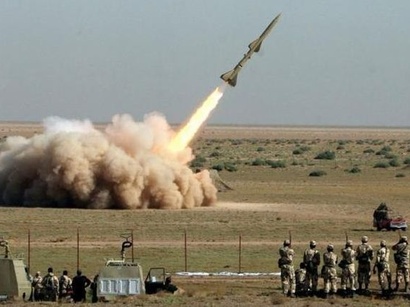Iran launches air drills to counter military threats

By Sara Rajabova
Iran launched large-scale air defense drills in the country's eastern part on Monday, Iranian media reported, amid heightened tensions between Tehran and Washington over a military incident in the Gulf reported last week.
The Velayat-4 drills are taking place in eight provinces of Iran - - North Khorasan, Khorasan Razavi, South Khorasan, Sistan and Baluchestan, Kerman, Hormozgan, Yazd and Fars.
The maneuvers being held this week span 850,000 square kilometers and include about 8,000 troops, drawn both from Iran's Islamic Revolutionary Guard Corps (IRGC) and its regular military, Reuters reported.
Last week, the Commander of Khatam Al-Anbiya base Farzad Esmaili said that the drills would be supervised by the base, while Iranian army, IRGC and Basij volunteer paramilitary force would jointly participate.
F-4, F-5, F-7, F-14, SU-24, MiG-29 fighter jets, as well as reconnaissance aircraft are being showcased during the exercises.
Iran is also showcasing and testing its radar systems, missiles, artillery and electronic suveillance systems.
Iran previously held Velayat-3 drills in 2011, where an array of fighter jets, fighter bombers, cargo and transportation planes, including F-4, F-5 and SU-24 fighter bombers, MiG-29 and C-130 planes were showcased.
New domestically designed defense systems and missile systems will also be tested during the four-day joint air defense exercise, Shahrokh Shahram, the spokesman for the drills, said on Sunday, IRNA news agency reported.
The maneuvers aim to enhance combat capabilities of the Iranian military and provide it with the opportunity to practice modern military tactics to counter what is said to be new military threats against the country.
Last week, the Pentagon said Iranian warplanes opened fire on an unarmed US drone over international waters on November 1.
Iran said it had repelled an aircraft violating its airspace over the southern coastal waters of Southern Bushehr province and said the drone was on an intelligence gathering mission near Kharg Island, Mehr news agency reported.
The deputy commander of the Islamic Revolution Guards Corps, Brigadier General Hossein Salami, said on Sunday that Iran has firm evidence that the US drone had entered the country's airspace.
"We are fully aware of international regulations and do not attack any aircraft outside our country's borders," Salami said.
He added that the aircraft definitely violated the country's airspace, and if it had not done so, Iran would not have attacked it.
The commander of the IRGC Aerospace Force, Amir Ali Hajizadeh, said on Sunday that the US drone entered Iran's airspace with the aim of spying and collecting information related to Iranian oil tankers near Kharg Island.
"The drone was flying near Kharg Island and our understanding is that ... it was gathering economic information and intelligence on Kharg Island and oil tankers [in the area]," Hajizadeh noted.
Kharg, 25 kilometers off the Iranian mainland, is the Islamic Republic's main export terminal for its oil.
"The Islamic Republic of Iran has some red lines that the Americans should understand and respect. If they do it again they can expect an even stronger response," he added.
According to the timeline provided by the Pentagon, two Iranian Sukhoi SU-25 aircraft intercepted the US drone on November 1 at about 4:50 a.m. EST (0850 GMT) as it conducted a routine, but classified, surveillance mission over Persian Gulf waters about 16 nautical miles off the Iranian coast.
Pentagon spokesman George Little said the aircraft fired multiple rounds at the Predator drone and followed it for at least several miles as it moved farther away from Iranian airspace.
International airspace begins after 12 nautical miles and Little said the drone at no point entered Iranian airspace.
The incident underlined the risk of escalation in tensions between the United States and Iran in an ongoing dispute over Tehran's nuclear program, analysts believe.
Western nations led by the United States have imposed tough sanctions on Iran this year in an attempt to curb its nuclear program that they say is designed to produce an atomic bomb.
The United States and Israel have not ruled out military action against the Islamic Republic, if diplomacy fails to resolve the row. Iran denies the charge, saying its nuclear work is purely for peaceful purposes.
Tehran stresses that the country has always pursued a civilian path to provide power to the growing number of Iranian population, whose fossil fuel would eventually run dry.
Here we are to serve you with news right now. It does not cost much, but worth your attention.
Choose to support open, independent, quality journalism and subscribe on a monthly basis.
By subscribing to our online newspaper, you can have full digital access to all news, analysis, and much more.
You can also follow AzerNEWS on Twitter @AzerNewsAz or Facebook @AzerNewsNewspaper
Thank you!
